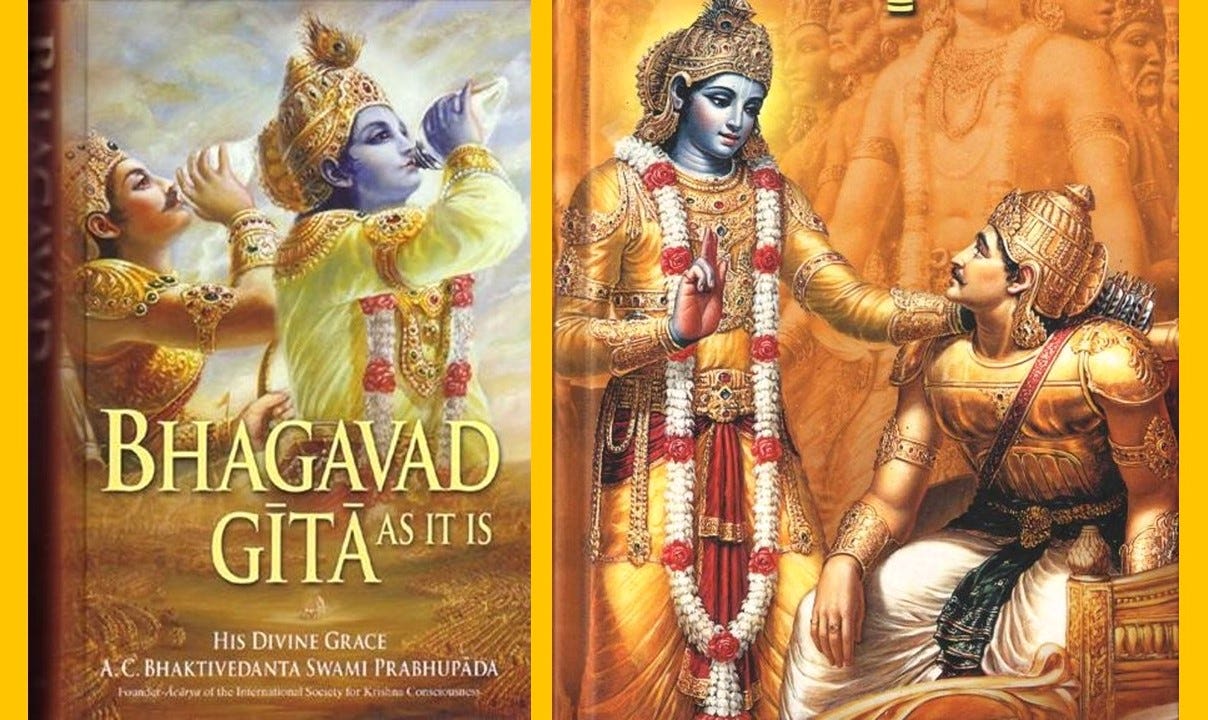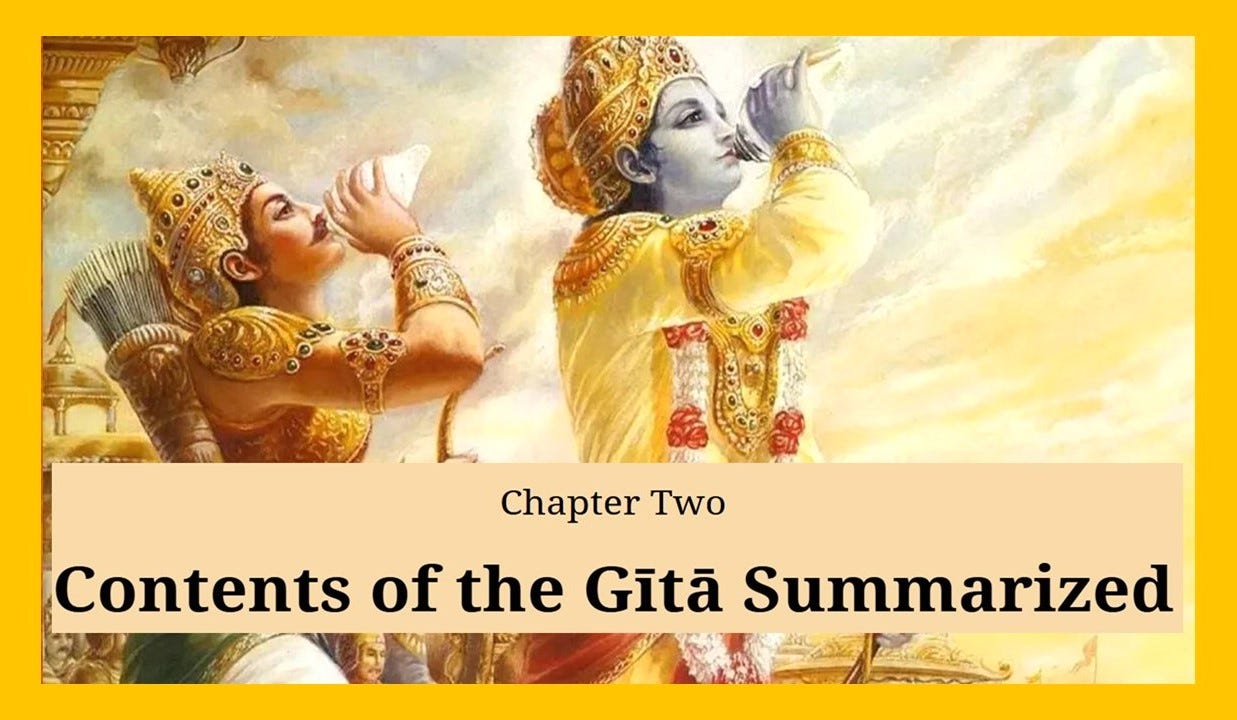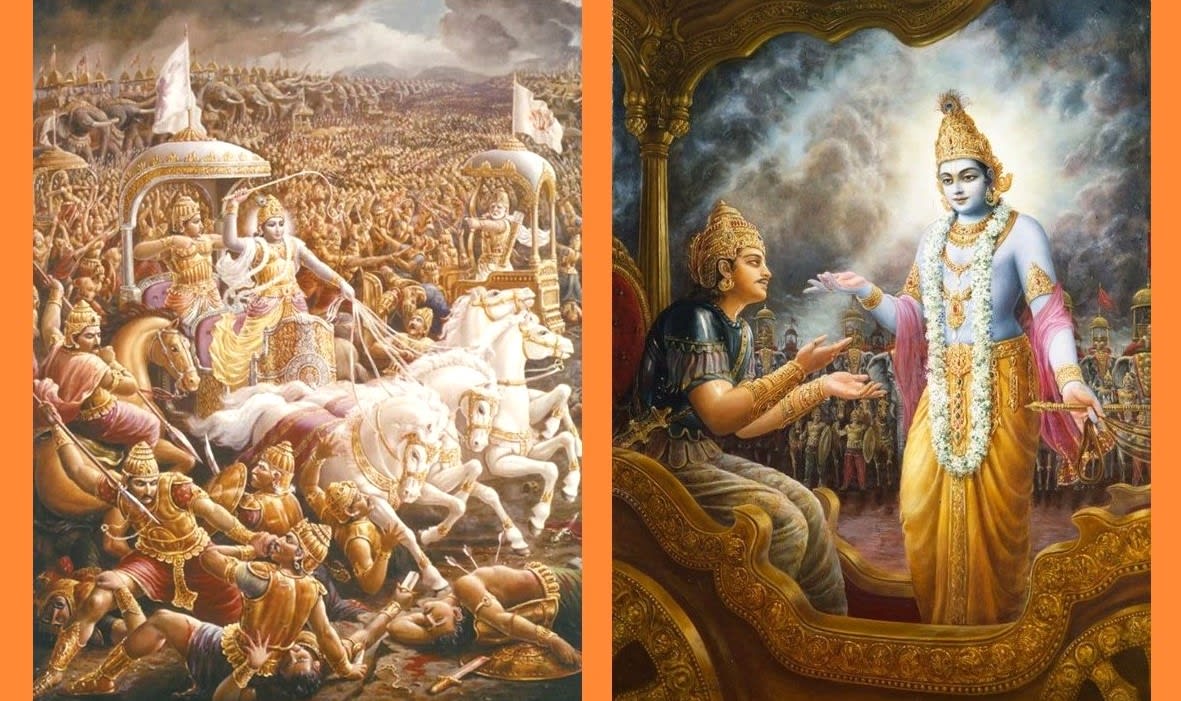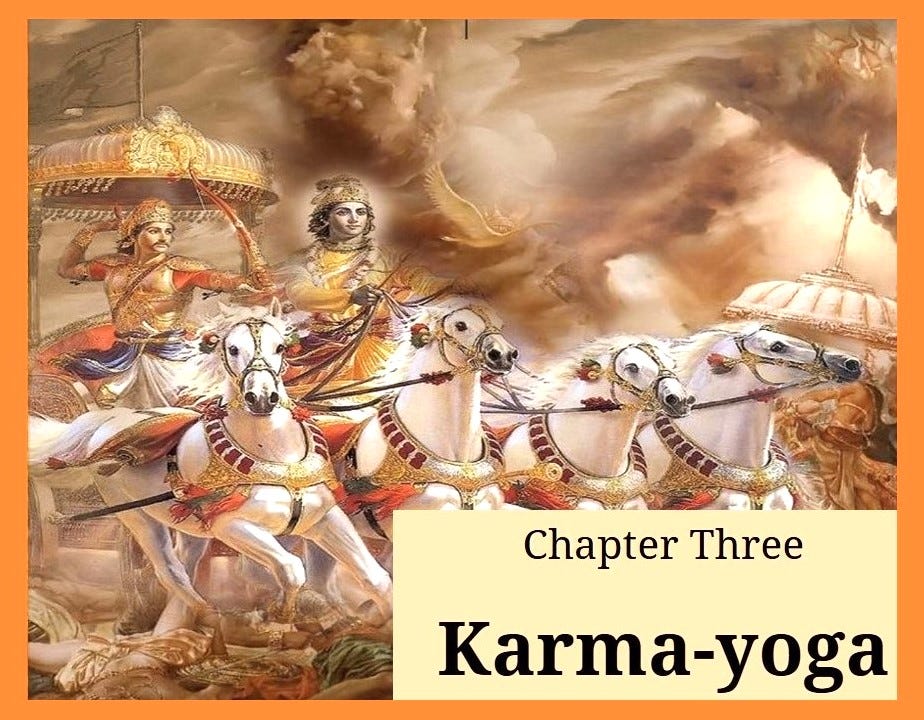War Within
The Mysteries of Real Self Part I
WAR WITHIN
The great warrior Arjuna stood looking at the expanse of the vast army standing opposite him. Accompanied by his dear friend and guide, Krishna, he was about to embark upon the most significant, most ferocious war of his life that the world had ever seen. He and his four brothers had been mistreated and wronged violently in numerous ways by the arrogant and unruly sons of King Dhritarashtra. Being envious and immature, they always acted against the principles of religion, and their rule on earth was detrimental to its citizens. Arjuna, now accompanied by his four brothers, was about to wage a great fratricidal war on these aggressive and irreligious brothers and the clans supporting them.
In this war zone, a great song was sung by Krishna —a highly instructive, profound, and sublime song about Self-realization, Ultimate reality, and Spiritual truths. This song would be sung and sung anew for all time to come. This wonderful compilation of Krishna’s instructions to Arjuna is called the ‘Bhagavad Gita’ (Song of God).
Krishna is the Supreme Person- the Absolute Truth. His instructional song was not only meant to guide Arjuna but also to encourage all people, at all times, in pursuing the righteous path, pushing them towards achieving mastery of self, knowledge about one’s existence in this world, one’s identity, purpose, true nature, and the path to ultimate freedom. Those choosing to hear and properly understand the sublime instructions of this song may then decide to live by its injunctions and abide by Krishna’s life-changing advice.
I am presenting a few select instructions from each chapter that may encourage readers to read the full version (Bhagavad Gita As It Is) and study the spiritual science in-depth to gain more nectar and more profound realizations.
Chapter 1. Observation, Evaluation, and Introspection:
What is the problem?
Supreme Lord Krishna had taken the position of Arjuna’s charioteer for the duration of the war. Seated upon his chariot, Arjuna looked upon both armies assembled to fight this great war. Both sides examined their armies, and Duryodhana, the leader of the Kauravas, felt especially assured of their success as he had amassed a mighty army with the greatest generals, warriors, fighters, and commanders of all time.
Arjuna had several great warriors on his side and was well matched against Kaurava’s army. Moreover, the Supreme Lord Krishna, even though He was not fighting, was driving Arjuna’s chariot. Therefore, Arjuna felt extremely confident about their victory. Yet, he requested Krishna to drive his chariot in the midst of the battlefield, where he could inspect both assembled parties and gauge their potential.
As he looked on at his family members, teachers, cousins, uncles, and numerous other relations on the opposing side, he was overwhelmed with the feeling of impending destruction, chaos, and havoc that he was about to wreak for both sides, causing a mass destruction of families and potentially committing a sinful act. He was suddenly overcome with numerous doubts about waging this war. Being a simple, pure-hearted soul and having faith in Krishna’s guidance, he started expressing each doubt that assailed him.
Chapter 2: Identity and Purpose:
Who am I, and why am I here?
As Arjuna considered several reprehensible outcomes of the war, he felt overwhelmed with negative emotions and began to question the purpose and goal of this war. He expressed his desire to retreat and renounce such abominable actions that will cause unimaginable devastation and incur sins. He turned to Krishna for clarity, guidance, and instructions. Recognizing Krishna as his greatest well-wisher, friend, and teacher, he pleaded for guidance. Should he fight this war or retreat?
Krishna began speaking about the root cause of Arjuna’s confusion, the consequences of retreat and renunciation, proper action, and the motivation behind this action. Krishna told Arjuna that his confusion about fighting this war stemmed from a misunderstanding of his own true identity, nature, and purpose in the world. Essentially, Krishna informs Arjuna that he has forgotten his true identity.
Living entities are actually spirit sparks or souls, but they have misidentified themselves as their physical bodies. This misconception leads to misleading actions, with a misguided purpose and falsely directed compassion. The soul is eternal, spiritual, indestructible, immutable, and part/parcel of the Supreme; it does not belong to this world and is temporarily trapped in this physical world. Its ultimate goal is to escape this illusory world and achieve freedom from transmigration through different bodies and different species. It belongs where ultimate reality exists. Yet, souls enter into a perpetual cycle of birth and death due to their actions that are falsely directed, impure desires, and unwanted qualities. Any action performed with bodily conception, which caters solely to the bodily needs of oneself or others, is considered a misdirected and misleading work and can lead the soul astray from its true purpose and proper action. This causes further bondage in this world.
Arjuna, as a learned soul, is not expected to fall into this trap of misconceptions. Yet, he acts from a bodily understanding and directs his compassion toward aggressive and violent individuals. Moreover, his sense of purpose is lost, due to which he is acting contrary to his nature as an expert warrior. In his situation, retreat from fighting a righteous war will actually be sinful and earn him disgrace.
A soul is on an eternal journey through this world, and the current body is just one chapter of its infinite existence. Each soul should perform actions through the body to maintain harmony with both the physical world and the divine plan (Dharma). This is its duty and purpose in the world. Each action performed by a soul has consequences, and it is recommended that we align our actions with the will of the supreme rather than for personal gain or gratification. Thus, we are advised to perform righteous actions with a sense of detachment, without becoming overly attached to our material motivations. Neglect of our assigned purpose creates entanglement for the soul, and it continues its cyclical journey in this material world of dualities.
In this case, fighting this war will establish a righteous rule, which will be a credit to Arjuna and favorable for numerous future generations.
Chapter 3: Service and Sacrifice:
How to work in this world?
One of the soul’s duties is to pay off its cosmic debts while within a human body to achieve freedom from the process of transmigration through different species. This freedom can be achieved by cultivating knowledge, leading a secluded life, and following a rigorous path of renunciation from worldly pursuits. Yet, Krishna recommends not to abstain from work, but rather to engage one’s mind/senses/intelligence in performing prescribed duties with due diligence.
Such actions should be righteous and performed in the mood of love and service with vigor, joy, and absorption. Work should be undertaken for the welfare of living entities and performed for the pleasure and satisfaction of the supreme person and His representatives. This pays off the cosmic debts that the soul incurs during its journey through the material world.
In this way, Krishna enlightens Arjuna about the nature of the soul, its purpose (to achieve freedom from material existence), and the importance of work in service (without personal gain, for the satisfaction of the Supreme). Next, Krishna will elaborate in detail on acquiring knowledge of the Supreme, the eternal, timeless wisdom of spiritual truths, the distinction between renunciation of work and work in service, and the control of the mind through meditation.
Stay tuned for the next three chapters to understand:
‘The Mysteries of the Real Self- War Within’









Eagerly waiting for next part
Eagerly waiting for next part